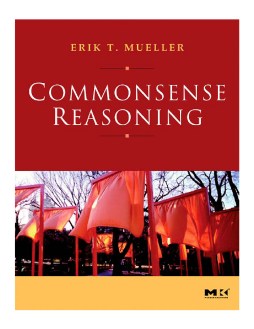
Additional Information
Book Details
Abstract
To endow computers with common sense is one of the major long-term goals of Artificial Intelligence research. One approach to this problem is to formalize commonsense reasoning using mathematical logic. Commonsense Reasoning is a detailed, high-level reference on logic-based commonsense reasoning. It uses the event calculus, a highly powerful and usable tool for commonsense reasoning, which Erik T. Mueller demonstrates as the most effective tool for the broadest range of applications. He provides an up-to-date work promoting the use of the event calculus for commonsense reasoning, and bringing into one place information scattered across many books and papers. Mueller shares the knowledge gained in using the event calculus and extends the literature with detailed event calculus solutions to problems that span many areas of the commonsense world.
- Covers key areas of commonsense reasoning including action, change, defaults, space, and mental states.
- The first full book on commonsense reasoning to use the event calculus.
- Contextualizes the event calculus within the framework of commonsense reasoning, introducing the event calculus as the best method overall.
- Focuses on how to use the event calculus formalism to perform commonsense reasoning, while existing papers and books examine the formalisms themselves.
- Includes fully worked out proofs and circumscriptions for every example.
“A comprehensive exposition of reasoning about actions and change using the circumscription-based Event Calculus. The book has an excellent up-to-date bibliography on actions and change.
-Chitta Baral, Arizona State University
“Central to the idea of Artificial Intelligence is getting computers to understand simple facts about people and everyday life—what we call Common Sense. Amid the technical discussions about inference algorithms and knowledge representation, a larger question arises: What have we actually learned in the past 30 years about how to put Commonsense knowledge in computers? Look no further than Erik Mueller's Commonsense Reasoning for a deep and insightful survey of the state of the art in this topic. Some say that Commonsense defies logic; here Mueller shows that logic, at least, can put up a good fight.
-Henry Lieberman, MIT Media Laboratory
“Erik Mueller has given the most thorough treatment of common sense knowledge and reasoning yet to appear.
-John McCarthy, Stanford University
“The strength of this book is that it uses a uniform representation formalism, the event calculus, to solve a variety of commonsense reasoning problems. Researchers will find the book an inspiring tool which provides many ideas for applications of action formalisms. Thanks to both the exemplary presentation style and numerous examples, the book is also well-suited for teachers and students alike.
-Michael Thielscher, Dresden University of Technology
“Developing systems that can perform actions and deal with change is a major challenge in intelligent system design, because it requires the construction of sophisticated models for knowledge representation and reasoning. This book provides important ideas and methods which can be used to model commonsense reasoning about events in complex and dynamic environments. The content is well thought out, and difficult topics are presented in highly accessible ways. The author tells a compelling story that highlights the utility of event calculus for applications that require commonsense models of action and change.
-Mary-Anne Williams, University of Technology, Sydney, and Knowledge Representation and Reasoning Inc.
People with better commonsense than others are better observers of context and have more patterns that are more readily accessible.
Nevertheless, commonsense reasoning is an important area of study. Mueller's book will be valuable to those involved in this field.- Robert W. Ferguson, Software Quality Professional 12/06-2/07
